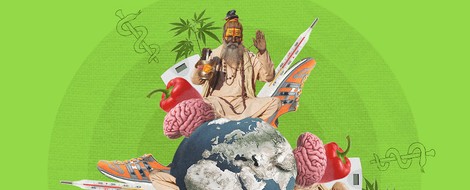Your podcast discovery platform
Curious minds select the most fascinating podcasts from around the world. Discover hand-piqd audio recommendations on your favorite topics.

piqer for: Global finds Health and Sanity Doing Good
Bangalore-based Rashmi Vasudeva's journalism has appeared in many Indian and international publications over the past decade. A features writer with over nine years of experience heading a health and fitness supplement in a mainstream Indian newspaper, her niche areas include health, wellness, fitness, food, nutrition and Indian classical Arts.
Her articles have appeared in various publications including Mint-Wall Street Journal, The Hindu, Deccan Herald (mainstream South Indian newspaper), Smart Life (Health magazine from the Malayala Manorama Group of publications), YourStory (India's media technology platform for entrepreneurs), Avantika (a noir arts and theatre magazine), ZDF (a German public broadcasting company) and others.
In 2006, she was awarded the British Print-Chevening scholarship to pursue a short-term course in new-age journalism at the University of Westminster, U.K. With a double Masters in Globalisation and Media Studies from Aarhus Universitet (Denmark), University of Amsterdam and Swansea University in Wales, U.K., she has also dabbled in academics, travel writing and socio-cultural studies. Mother to a frisky toddler, she hums 'wheels on the bus' while working and keeps a beady eye on the aforementioned toddler's antics.
Do You Have Willpower? Then Maybe You Should Read This
I have never been able to stick to any dieting schedule. I try though—every Friday while buying the weekly groceries, I will myself not to pick up cookies and shortbread. Come Wednesday, I am back at the local mom-and-pop, sheepish and defeated.
I thought my willpower – or at least what little of it there ever was – had withered away. Much to my chagrin, this article tells me, science is discovering that the very idea of willpower is withering.
For the longest time, the thinking was that people with a lot of self-control—the ones who can resist temptation majestically—are good at “inhibiting their impulses”. It was believed that they have a lot of willpower and know how to use it.
This article explores how this idea that self-control is dependent on willpower is now looking like a myth. For years, psychologists used the same tests to measure willpower and self-control but today tests that create internal, cognitive conflicts are used to measure self-control.
Curiously, many recent studies have stumbled upon a paradox. One study discovered that people who claimed to be best at self-control were hardly using it at all; another found out that students who exerted more self-control were not more successful in accomplishing their goals. In fact, students who experienced fewer temptations overall were more successful. Moreover, the students who had exercised more self-control reported feeling drained.
The article continues to explore several other facets of willpower and has a nice list of what works and what does not when it comes to self-control.
In effect, new studies are suggesting that the concept of willpower as a finite resource needs to be re-examined. By treating willpower as something absolute and unshakable, we are easily blaming our lack of willpower for our failings. This, as we all have experienced sometime or the other, leads to feelings of inhibition, low self-esteem and shame, and holds us back from actually finding solutions to our weaknesses.
Stay up to date – with a newsletter from your channel on Health and Sanity.
